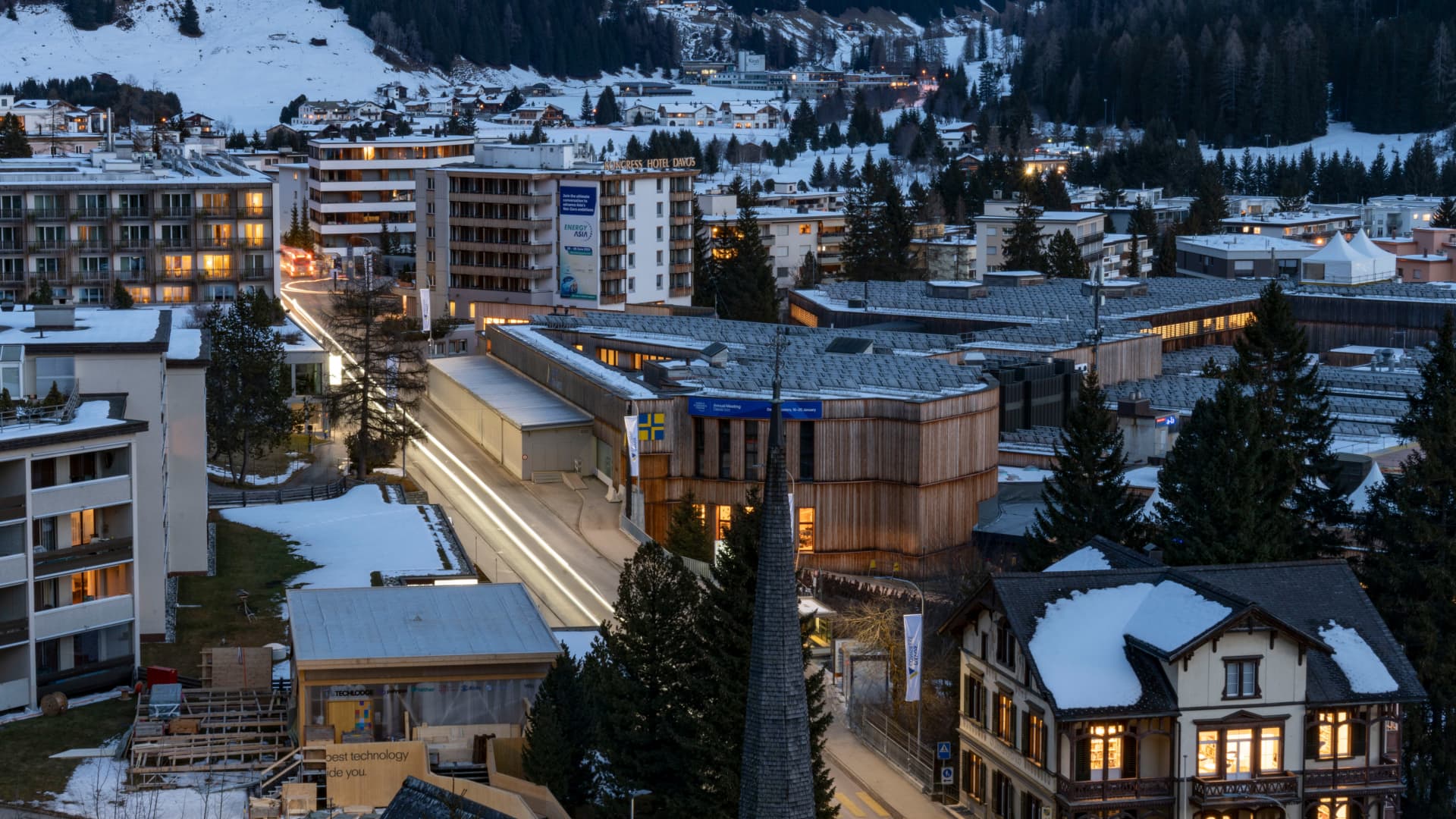Just one G-7 leader will join the Davos elite this year as regular people battle cost-of-living crisis

The Congress Center, the venue for the World Economic Forum (WEF), center, in Davos, Switzerland, on Saturday, Jan. 7, 2023.
Bloomberg | Bloomberg | Getty Images
Olaf Scholz is the only G-7 leader set to attend the World Economic Forum’s annual summit in Davos next week, with the German chancellor due to speak on the main stage for the second time since taking office in 2021.
It is not the first time the summit has been sparsely attended by leaders from the powerful political union. Over the last decade, sometimes only two or three have made it to the picturesque Swiss mountain resort, and in 2017 only the U.K.’s Theresa May made an appearance — although it did attract Chinese President Xi Jinping. Their reasons for absence often involve more pressing issues being tackled at home.
But it does mark a decline from more recent years. The record was in 2018, when six of the seven attended. That included former U.S. leader Donald Trump, who attended twice during his one term in office, unlike his predecessor Barack Obama, who never attended.
The 2023 summit, which is a return to tradition after two years of pandemic disruption saw it held online in 2021 and held in May rather than January in 2022, will nonetheless be packed with high-profile names from the worlds of business and finance, politics, media, academia and civil society.
Held under the tagline of “Cooperation in a Fragmented World” from Jan. 16-20, panelists and keynote speakers include South African President Cyril Ramaphosa, former U.S. Secretary of State Henry Kissinger, World Health Organization Director General Tedros Ghebreyesus, U.N. Secretary General Antonio Guterres, and the actor Idris Elba.
Scholz is due to give a special address on Wednesday at 3:45 p.m. local time. His own predecessor, Angela Merkel, was a regular Davos presence during her 16-year term, most recently challenging the increasing “own interests first” mentality of some nations in 2019.
While Scholz’s G-7 counterparts will all have their own reasons for their absence, politicians are inevitably wary of being seen “hobnobbing with a global financial elite,” Ed Owen, a former political advisor and founder of consultancy The Story Network, told CNBC.
“I expect it is partly reputational risks, given the current situation, of enjoying the high life in Davos,” he said.
That situation includes inflation running sky-high in nations around the world. The WEF’s own pre-summit annual risk report said the cost-of-living crisis was the biggest threat to the world today, highlighting the impact of the energy crisis, food scarcity and higher prices on the most vulnerable.
Politicians like U.K. Prime Minister Rishi Sunak have a particular issue, Owen continued, given that one of the opposition Labour Party’s main attack lines is that he is detached from everyday life.
He and his wife have an estimated fortune of £730 million ($844 million), according to the Sunday Times Rich List.
The U.K. will still have a presence at the 2023 summit. A spokesperson confirmed Business Minister Grant Shapps and Trade Secretary Kemi Badenoch would both be there, while Sunak remains “focused on work to deliver on the British people’s priorities.”
They added the government feels it is important to “continue to build relationships with other countries” and make the U.K.’s voice heard on a global stage.
Meanwhile, both Labour’s leader, Keir Starmer, and shadow business minister, Rachel Reeves, will be in attendance.
“Sunak wants to convey he understands the trials of life and avoid being characterized in a certain way, whereas Starmer needs to demonstrate he’s an important figure with an international profile, it’s a plus for him,” Owen said.
Davos has increasingly become the subject of criticism, with some accusing attendees of elitism and hypocrisy — for example for arriving in private jets to discuss climate change.
In 2019, Dutch historian Rutger Bregman accused many of his fellow attendees of failing to pay a fair share of taxes while speaking of “participation, justice, equality and transparency.”









